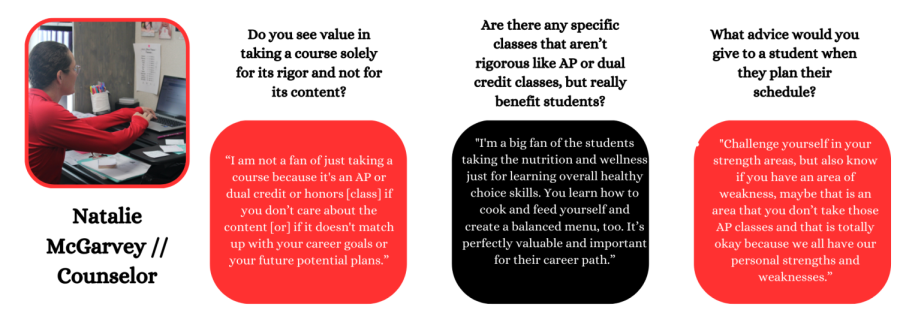The hardest class is not always the smartest choice
April 17, 2023
Many high school students feel pressure to take as many rigorous courses as possible, despite the availability of equally beneficial on-level classes.
High school students are constantly being encouraged by their counselors, teachers, and parents to push themselves. This helps many students reach their full, academic potential in school when they can be otherwise unmotivated. However, an issue arises when students feel so much pressure to load their schedules full of honors and accelerated courses to the point where they don’t sign up for the classes that they’re genuinely interested in.
When students take classes that they’re invested in, they’re more likely to work harder and focus on mastering the material, as opposed to just skating by, according to CollegeVine. Classes that excite students also give them a reason to look forward to school even though they might be dreading other classes. Sometimes the chance to learn a new recipe or start a new painting can motivate students to work through their tests that week.
Not only can electives be fun, but they can also set students up for success in a career path later in life. There are many classes like culinary, nutrition and wellness, and business classes that aren’t as academically rigorous as AP or honors classes, but can prepare students for their future outside of school much better than other courses could, according to Understood.
Working hard in a class you’re motivated in can also improve your academic statistics more than a challenging class you won’t do well in. Achieving in areas such as class rank, GPA, and honor roll can be hindered by falling behind in difficult classes. By introducing a few, slower-paced electives into your schedule, you can increase your success in these factors, according to CollegeVine.
Another benefit to taking less-demanding electives is having fewer homework assignments and having more time out of school to participate in extracurricular activities, jobs, and social events, which are vital to a student’s overall health. As important as it is to be academically focused in high school, it’s equally important to be involved and have fun outside of school. Extracurriculars allow students to apply their skills in real-life situations and keep them motivated in the classroom, according to the US Department of Education.
This isn’t to say, however, that students shouldn’t push themselves in school. It is almost always a good idea for students to push themselves with honors or accelerated classes, as long as they have the capacity and the drive to do well. For someone who plans on pursuing a career in STEM, perhaps AP Calculus and AP Chemistry are the perfect courses to add to their schedule. But for someone who wants to pursue the performing arts, orchestra and theatre classes are likely to be more beneficial and more engaging than AP Biology.
Taking a variety of courses not only improves the academic success of students, but it is simply advantageous for their general well-being. Classes that students are confident they’ll succeed in are not only a boost to their confidence, but also help to reduce their stress levels, according to CollegeVine.
In general, pushing yourself in school and stepping outside of your comfort zone is always something that should be encouraged by parents and teachers alike. However, too much pressure can lead to an overload of work and anxiety and will end up being much more harmful than it was helpful. A healthy balance of challenging and exciting courses can be reached, and this should always be kept in mind when you’re planning your schedule for the next school year.


